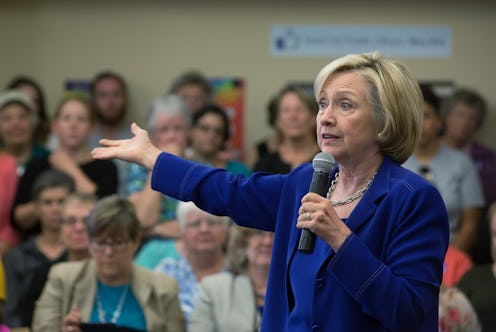News
Hillary Addresses Emails, Basically Says Back Off
Tuesday was a huge day for Democratic presidential frontrunner Hillary Clinton, owing to the occasion of her first major press interview — she sat down to speak with CNN's Briana Keilar, and the pair covered a number of topics. Including one area of conversation that's been dogging her for months now, one which she hasn't offered much comment on since a press conference in March — that's right, I'm talking about that private email controversy. Hillary Clinton talked about the emails in her CNN interview, and her response was that everything was legal and proper.
While the email story had somewhat faded from the headlines since March, it was stirred up again last week when the State Department released a selection of 3,000 messages sent from her private email account — that she had a private account at all has raised criticism, thanks to the ever-present threat of hacking and cyber-warfare in this day and age.
It probably shouldn't come as much surprise that Clinton didn't dive into the issue with much scrutiny so as to reinflame any criticism — from her perch as the frontrunner in the Democratic field, outpacing the still-distant second-place challenger Bernie Sanders of Vermont, it could be a conscious political strategy to not dive into certain sensitive topics when she can avoid it. But to Keilar's credit, the issue was raised in the high-profile interview, giving us all a chance to see how Clinton responded in an on-the-record setting.
As Keilar asked her to explain her mindset in deleting tens of thousands of emails from her private server after her tenure as Secretary of State, Clinton made her disdain for the issue obvious.
Everything I did was permitted. There was no law, there was no regulation, there was nothing that did not give me full authority to decide how to communicate. Previous Secretaries of State have said they did the same thing, and people across the government knew that I used one device. Maybe it was because I'm not the most technically capable person, and wanted to make it as simple as possible.
Keilar didn't let the issue lie, however — she pressed further, invoking a subpoena over Clinton's emails, something the former Secretary disputed immediately.
You're starting with so many assumptions, I've never had a subpoena. Let's take a deep breath here. Everything i did was permitted by law and regulation. ... I chose to turn over 55,000 pages because I wanted to go above and beyond what was expected of me, because i knew everything that was official was already in the state department system.
Obviously, this was but one small, isolated part of a far rangier interview, and to be fair to Clinton, the email criticism has always been less about her qualifications and viability as a candidate and a potential president than her transparency.
But considering how the full scope of the interview, transparency issues seem like they could get pretty crucial for her. Keilar also questioned Clinton about her flagging trustworthiness ratings, asking whether she bore any responsibility for the situation, and Clinton didn't cede much ground — she instead blamed Republican narratives and attacks.
Clinton has drawn some fire over the last week for her campaign's treatment of the press, and while it's still too early to say whether the more controlled, reserved approach will help or hurt her, this much seems clear: she's trying not to extend herself unnecessarily, unless a real threat were to emerge from the Democratic field. The more you have to duke it out in the primaries, laying out concrete policy positions (Sanders will surely challenge Clinton from the left), the harder it can be to recalibrate your image for a general election's national audience.
And all candidates do attempt that kind of recalibration, even if they never say it. That was essentially what Romney campaign adviser Eric Fehrnstrom meant with his infamous "etch-a-sketch" remark in 2012, which brought a lot of derision and criticism on the campaign.
This could potentially be a risky strategy, sure, although there aren't any Senator Barack Obamas out there anymore. Whatever you think of Bernie Sanders, who's well-loved by many in the party's left-wing, he's not quite the charismatic rhetorical force that Obama was in 2008.
But obviously, Clinton has to submit to questions from the press every now and then, and Keilar was first-up to secure that opportunity. Clinton's explanation on the email controversy will surely not be enough for her critics, and maybe even some of her supporters, but it remains to be seen whether this is something that voters will truly care about when the early primaries roll around.
Images: Getty Images (2)
